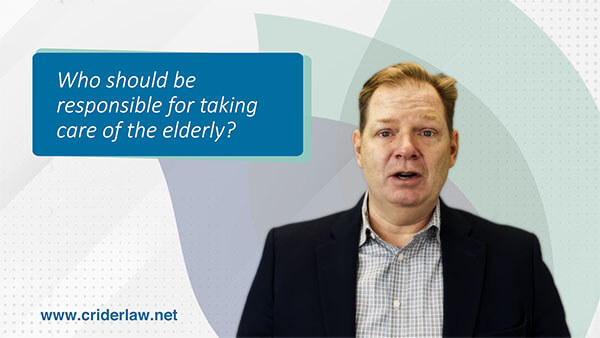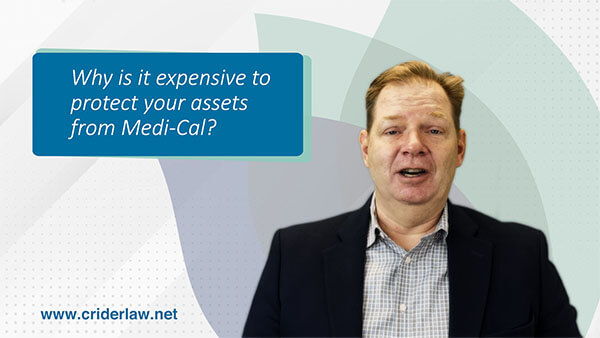TRANSCRIPT:
Hi. I’m Matthew Crider. Thank you for asking us to help you with your estate planning.
Whether you’re brand new to estate planning or it’s been a number of years since you did your planning and you want to update or change your plan, I wanted to talk with you a bit about what estate planning is.
Imagine a ladder leaning against a building. You’re standing in front of the ladder, facing the building. If you’re standing on the ground, most people will think that they don’t have a plan. Actually, you do have a plan. Even if you haven’t signed formal documents, you have the State of California plan and the IRS plan. You’re not going to like it, but it’s there for you if you do absolutely nothing and don’t take any action.
Since you’re coming in to meet with us, you do want to take one step up the planning ladder. If you’re on the very first wrung of the planning ladder, that’s where you have a will as the primary document to distribute your assets when you pass away.
A will is a document that you create during your lifetime. When you pass away, it distributes the property to the people that you’ve listed in the will. There are some problems with the will. The first problem and the main problem is that it has to go through a probate. A lot of people have heard that probate is something that you want to avoid in California. That’s certainly true.
Probate is a court process where the judge is empowered to act as a referee. As the referee of the will, the judge will make sure the property goes to the correct people, the people who were listed in the will.
There are several problems with probate. The first problem is that it’s a very slow process. On average, it takes anywhere between 12 and 18 months from the time the will is first submitted to the judge until the judge signs an order, saying that it’s OK to distribute property to the people listed in the will. That’s a very long time, particularly if you have family members who might be relying on that distribution.
The second problem with probate is that it’s very expensive compared to other estate planning tools that you have. For most people who are incredibly wealthy, they don’t have an issue with estate tax. It’s not that the estate will be taxed by either the, federal government or the State of California.
What the cost of probate reflects is that the person that you name as an executor under a will can charge a fee for his or her services. This makes sense because that person, the executor, is going to be managing your assets and they have to figure out everything that you own. They have to alert the beneficiaries. There can be a lot of work involved with that. The law says that they’re entitled to a fee.
The fee is a percentage of the total probate estate. What that means is it’s the fair market value of the probate estate on the date of death but without subtracting any debts. If your house, for example, is worth $500,000 but has a mortgage of $400,000, the probate fee will be based on the $500,000 fair market value. It can be very expensive.
As an example, if somebody has a million‑dollar estate, the executor’s fee could be $23,000. The executor can also hire an attorney to help him or her administer the estate and go through probate court. The attorney is paid the same way. The attorney is paid as a percentage of the gross estate value.
As with the estate worth a million dollars, the executor’s fee could be $23,000, and the attorney’s fee could be $23,000. That’s a lot of money. The third problem with probate is that everything that happens in court is a public record. The will gets filed with the court clerk. Anyone who wants to see it can go take a look at it.
The very last thing that the executor does is file an inventory, listing the property that you own on your date of death, along with the value. On the one hand, you have who’s going to get your property, who will inherit it. On the other hand, you have what it’s worth and what it is. That’s a lot of information to have out there in the public domain.
The fourth problem with probate comes from the fact that the law will take care of a beneficiary if that beneficiary is a minor. If that beneficiary is, say, 16 or 17 years old, the court will take affirmative steps to protect their inheritance. If somebody is legally an adult, the law says that they are entitled to the distribution outright, regardless of circumstances.
You could have a scenario where, perhaps, a beneficiary is 18, 20, even 25 years old and might not be very financially mature. If they inherit 20, 30, 50 thousand dollars, that can be very bad. They’ll probably blow through it pretty quickly.
Those are the four problems with probate. It’s a very slow process. It’s an expensive process. Everything is public record. You lose a lot of control. That’s the first wrung of the planning ladder that I mentioned. Most people want to avoid probate so they will take one step up the planning ladder. Once they’re on the second wrung of the ladder, that’s where we get into a revocable living trust.
A revocable trust or revocable living trust is a contract that you write with yourself about how your property will be managed, both during your lifetime and when you pass away. A lot of times, I describe a trust like being like a bucket, like one of those five‑gallon buckets that you might buy at Ace Hardware or Home Depot.
As the person creating the trust, you create the bucket. You are the initial trustee during your lifetime. You hold a handle to the bucket. You, as the trust owner and the trustee, you could transfer property into the bucket. You can take property out of the bucket. You have complete control over what’s in the bucket and how the bucket is managed.
When you pass away, you hand the handle to the bucket off to somebody else. They know what to do with the property that you’ve left them in the trust or in the bucket because you’ve left them instructions on the outside.
That essentially is how a trust works. You designate a successor trustee to take over in the event that you become incapacitated or once you pass away. That successor trustee will have management and control over the property that is named or owned by the trust. That’s how a trust works.
Then if we take one step further up the planning ladder, that’s where we get into an irrevocable trust. An irrevocable trust, as the name suggests, is a trust that can’t be revoked. It can’t be changed unless you go to court and convince a judge that the trust should be changed.
The reason that people create an irrevocable trust is because they have a specific estate planning goal. An irrevocable trust is very similar to a revocable trust. The difference though is that whereas the revocable trust is like a bucket that you hold the handle to the bucket, the irrevocable trust is like a bucket with a lid on it.
Once you create the trust and once you transfer property to the trust, typically, a separate trustee, namely a trusted family member or loved one or very trusted family friend, will take over management and control as trustee of the trust.
The reason that people will create an irrevocable trust is usually because they have a specific estate planning goal. An example could be, for instance, if they want to try to get qualified for medical or to get certain types of veteran’s benefits from the Veterans Administration. Those are some of the purposes that we use an irrevocable trust for.
That essentially is the planning ladder. If you’re standing on the ground, you haven’t done any planning. You’ve got the State of California plan that you might want to avoid.
If you take one step up the ladder, that’s where you have a will as the primary tool to distribute your assets. We talked about some issues with that.
If you take one further step up the ladder, you have a revocable living trust as the tool to distribute assets.
Then finally, if you take another step up the ladder, you might have an irrevocable trust to help you get qualified for certain long‑term care benefits.
There are other documents that are part of a comprehensive estate plan. The first is a durable power of attorney. The durable power of attorney is where you designate somebody to make financial decisions for you if you’re not able to do so yourself. If you’re not able to manage your day‑to‑day finances, you can have somebody make those decisions and somebody manage your assets for you.
Another document is sometimes called a power of attorney for healthcare. It’s also called in California an advanced healthcare directive. An advanced healthcare directive is where you designate someone to make healthcare decisions for you if you’re not able to make healthcare decisions for yourself.
If you become incapacitated, instead of having to go through conservatorship, which requires going to court, you can plan in advance to have somebody make financial decisions for you and to have somebody make healthcare decisions for you.
That is a general overview of the estate planning process. That’s a comprehensive estate would include all of those types of documents, usually a revocable trust, a power of attorney, and an advanced healthcare directive.
If you have any questions, please let me know. I look forward to talking with you at our very first meeting to talk about estate planning and what your goals and objectives are. Thank you very much. I’m Matthew Crider.









